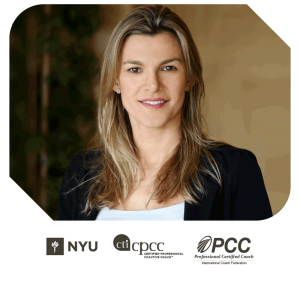When I think about Purpose, the words that come to mind are connection, values, passion, fulfillment, and depth. Several years ago, when I first started this work, I have to admit I had a really hard time understanding the idea of Purpose. I remember in a coaching training where the subject was “Fulfillment,” I told the facilitator: “How can I connect to my bigger purpose if I feel like my life is full of obligations, responsibilities and tasks?” I continued: “Routine demands around my kids have been exhausting. At work, it is all about pressure, deliverables, results.” I felt really disconnected to anything bigger than just accomplishing those things and checking the boxes, day after day. Finally, I learned and allowed myself to move from 100% thinking to feeling more. From non-stop doing to being more present. And to connecting with the heart when I was too much in my head.
When we look at the definition of purpose in the dictionary, it can be defined as a noun and as a verb. As a noun, it speaks to “the reason for which something is done or created or for which something exists.” As a verb, it is to “have as one’s intention or objective.” To me, Purpose is our essence. It is at the deepest core of all of our intentions. It is the reason to exist and the reason it is worth waking up daily and doing our best. It is deeply connected to our values, which are the things that are most important to us, the guiding principles of our journeys. Values are developed throughout our lives and are based on our experiences, education, family environment, culture, and beliefs. They are so important when we are identifying our Purpose because they are the basis of the work.
In several areas of my work – coaching, leadership, careers – purpose seems to be always present in the process of human development and growth. There is a lot written out there about Purpose and it has become a subject of great interest in different circles. I was personally inspired by Jomara Fernandes, a Brazilian friend who has this beautiful mission of making our world a place with more purpose. She created the “Purpose Mining Game,” a gamification tool that creates the opportunity for individuals to identify and connect with their purpose in a fun, creative and collaborative way. The game became a tool in my own practice, and can be used by individuals, teams and organizations to explore this fascinating path towards discovering their Purpose.

Purpose comes with self-awareness and understanding of who we are. It may be expressed as a sentence, a few key words, or emotions that bring us fulfillment and a sense of worthiness to our lives. People may call or connect with Purpose in different ways. Some take it to a more spiritual level, connecting to God’s will or their mission in life. Others may connect to the power of the universe—that energy that moves us in directions that sometimes we are not even sure how it happens.
And why does it matter? Because having a purpose allow us to be true to ourselves in our work, relationships, and in our decision making process. It helps us to honor our values through behaviors and choices. These apply to small day-to-day decisions such as buying a product versus another, attending a meeting or missing it. Or it applies to major life decisions such as changing careers, having a child, or moving to a new country.

A misconception about Purpose is that it must be something related to a professional activity that is intended to help people. In that case, the purpose of a psychologist, educator, teacher, coach, or doctor, would be more easily defined and lived, as their work relates directly to helping others on a daily basis. I believe no matter what we do in our lives, if we have a profession or if we are home caring for our children, if we live in a poor country or if we were born in a wealthy family. Our Purpose will always have an impact on other people, since we are all interconnected through humanity. Purpose is like a light, that when it’s on, can shine through many places and have a strong effect and impact on others.
I worked for many years in the financial services industry in the United States and in Brazil. At the beginning of my career, I had a really hard time connecting with to purpose of the industry in general. I thought everything revolved around money – helping clients earn more, getting higher bonuses, generating profits, and bringing value to shareholders. One day, I attended a town hall with a very senior leader of the institution. He brilliantly explained the impact of the bank’s work beyond making money. He talked about how the bank was impacting education as they provided student loans to many young people around the globe. He talked about how the bank supported families by helping small business owners and entrepreneurs to raise capital and build their lives. He shared the number of job opportunities the bank created that year in several locations, and the impact of that to the economy. He mentioned we were working on some initiatives to reduce the use of paper in our offices and become more environmentally conscious and responsible. He talked about some specific community work the bank was doing with the support of many employees around the world. And on a more personal level, as a leader, he talked about his commitment to help people and teams by giving them opportunities to grow, develop, and accomplish things for themselves (and for the institution).
I will never forget that day. I was finally able to connect to the full Purpose of that organization. I was also able to connect my own Purpose to the Purpose of the place I worked hard for, and to which I dedicated so many hours of my life. From that moment on, my drive, motivation and engagement moved to a whole different level.
I do not mean banks or other organizations are not interested in making profits. That’s a key goal, otherwise a company cannot exist. However, as the conscious capitalism movement states, we can make profits in a conscious way, being a conscious business. Purpose is one of the four tenets of the Conscious Capitalism, which also include culture, stakeholder and leadership.

In general, Conscious Capitalism asks business leaders and entrepreneurs to define their purpose and the purpose of the organization, build a stakeholder map describing how value is added for each stakeholder, faster conscious leadership and a conscious culture for their organization.
Whole Foods Market is a great example of a profitable organization adhering to this framework and concepts. On the Purpose front, they state: “Our purpose is to nourish people and the planet. We’re a purpose-driven company that aims to set the standards of excellence for food retailers. Quality is a state of mind at Whole Foods Market.” You feel and see this when you go to a Whole Foods store, by the quality of their products, their value proposition, customer service and the way the staff operates. I love what Raj Sisodia stated in his book Conscious Capitalismon this topic. He says “Purpose is most powerful when it taps into a universal human truth. In other words, it is fully aligned with the higher aspects of what is means to be human.”
I believe when organizations start moving from sharing their mission and vision statements with their stakeholders from a far distance to sharing their higher Purpose at a deeper level, they will break barriers, become more transparent, and allow people to relate to them. That will consequently impact their brand, the ability to attract and engage employees and customers, and bring better results.
These concepts become even more relevant as we think about the younger generations, whom we know will not work or be loyal customers to an organization where purpose and connection are not present. Despite all technological advancements and the digitalization in the world, these principles will always be important to human beings and organizations. We know work/jobs in the future will be around innovation, creativity and leadership, while other processes and systems will become automated and digital. That makes even more critical to create conscious and purpose-driven cultures and businesses.
Finally, I want to end this article by sharing a brief story of a mailman who lives in a small town in Brazil and is passionate about reading and writing poems. He talked about his purpose in a short video that I recently received from a dear friend. In the video, the mailman shared that in every stack of mail he delivers to a home, he includes an additional piece of paper with a poem written on it. He said something more or less like this: “I see the mailman’s work as a poetic act because we always bring a message to the people. A poem is a message that touches people’s hearts and souls. By sharing poems, I found my own way to make the world a better place.” He believes that poems do not only exist in books. They can be seen right below our eyes, on the street, in front of us. It depends on how deep we can look into things. To me, this man is an inspiration of passion, connecting to Purpose on a day-to-day basis, and being fulfilled.
I invite you to become curious and explore your own Life Purpose. There are many ways to do that, and maybe a starting point is to ask yourself questions such as: What are my values? What matters to me the most? What am I passionate about? What do I want to leave as a legacy? If I could guess, what would I say is the reason I exist?
As Brene Brown states in her book Dare to Lead, “Curiosity and knowledge building grow together. The more we know, the more we want to know.” I invite you to dare to know, and start walking on this beautiful path of connecting to your own Purpose!
My name is Beatriz Nicolau. I am a consultant, coach and facilitator. My Life Purpose is to expand human consciousness through more awareness, understanding of values, beliefs, and by helping individuals reach their full potential. I believe this expansion opens up possibilities for people to trust themselves, live a more fulfilling life and develop strong connections with others.


Leave a Reply